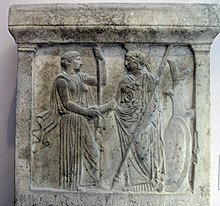Wikipedia:Thank you
This is an essay. It contains the advice or opinions of one or more Wikipedia contributors. This page is not an encyclopedia article, nor is it one of Wikipedia's policies or guidelines, as it has not been thoroughly vetted by the community. Some essays represent widespread norms; others only represent minority viewpoints. |
| This page in a nutshell: Remember to thank editors. We all like to be respected, and we all deserve respect. |
Thanks, I appreciate it.

Wikipedia is a collaborative process. No editor can write an article alone, or even a beautifully written lead section. Combining the ideas of a number of editors and using the writing, research and formatting skills of a range of contributors is our proven method for producing a more comprehensive and useful article, guideline or document.
When we are working on an article or guideline, we may have differing views on how the text should look. In some cases, the disagreement can flare up into a dispute. Even if there are very different views on what facts should be included or what language should be used, it is important to communicate about these issues with civility. Civility amongst editors is one of Wikipedia's key policies, meant to ensure respectful, decent interaction while we work on the encyclopedia.
But, going a little further than mere civility is not a bad idea. We all like to be respected, and we all deserve respect. Most of us respect other Wikipedia editors, even if we have never met them, simply because they are Wikipedia editors, and we are all working on to improve the encyclopedia together. As well, we all agree Wikipedia is a noble cause–even if we disagree about the wording of the last sentence of the lead.
In the Real World, simple words such as "please" and "thank you" go a long way towards facilitating calm, reasoned and respectful discussion. The same is true online. In fact, it is even more important online, because you don't have all the body language and nonverbal communication that is used face-to-face. It only takes a few seconds, and it is worth it. So, say thank you. (You can even say it twice.)
Thank you. Say it. It's easy. Say it first thing.
Thank you for replying.
I appreciate your thoughtful reply.
Thank you for your reply, but I disagree...
Thanks for getting back to me.
Thanks for reminding me of that.
Thanks for correcting my mistake.
Thank you for your ideas.
Say thank you when you mean it.

Thank you for bringing that to my attention.
Thanks, I didn't know that.
Thanks, I did not know that guideline.
Thank you for letting me know.
Thanks, I am getting it now.
Thanks for telling me, I would have gotten into trouble.
Thank you, I never would have thought of that.
Say thank you, and goodbye.
Thank you, we will talk again later.
Thank you, that seems to be all.
Thanks, and good luck with the last section.
Thanks, I have to go write an article.
Thanks, let's leave it up to other editors now.
Thank you, bye.
Say thank you, for whatever.
Thanks, but I'm not sure about that.
Thanks anyway for letting me know.
Thanks, just because.
Thanks for trying.
Thanks, though it doesn't suit me.
Thanks. though I disagree with you.
Thank you for putting a full stop at the end of your post.
Thanks for your advice, but I don't agree
See also
- Wikipedia:Please say please, an essay on the use of the word "please"
- Gratitude
- Co-operation
- Wikipedia:Expressing thanks
- Wikipedia:Expect no thanks, an essay on the need for gratitude
- Wikipedia:Notifications/Thanks
- {{Thank you}} / {{Thank You IP}} / {{WikiThanks}}
- Wikipedia:Barnstars, awarded in recognition for the accomplishments of others
- Wikipedia:Award barnstars, an essay about barnstars
